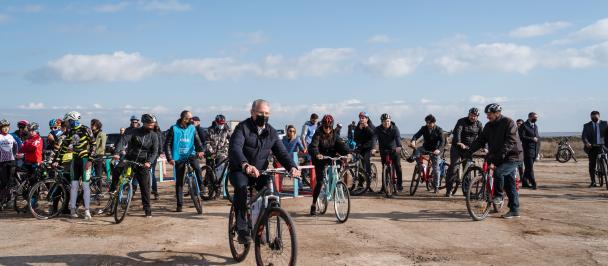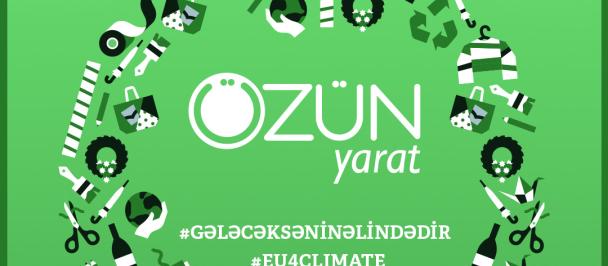Photo: UNDP Azerbaijan/ Mammad Aliyev
Siyazan, 23 September 2019 – The United Nations Development Programme (UNDP) and Azerbaijan’s State Oil Company SOCAR marked today an important milestone in their joint project to tackle climate change with the installation of new state-of-the-art associated gas capturing technology set to reduce methane emissions by on-shore oil field in Azerbaijan by 20 percent.
The new cutting edge compressors and separators which have been installed in the Siyazan oil fields will help collect associated gas from the crude oil and distribute it to the end-user consumers around 15 villages in the Siyazan mountainous area of North Azerbaijan. It is estimated that more than 600 households and 1250 individuals who had previously no access to clean fuels will directly benefit from this programme, since 7 mln cubic metres of gas, including 4.6 mln m3 of methane previously vented into the atmosphere will now be delivered to their homes.
The near $1 million investment has been made possible by funding from the Global Environment Facility and UNDP and is part of a larger energy efficiency project on Nationally Appropriate Mitigation Action (NAMA) implemented in Azerbaijan in partnership with SOCAR since 2015.
UNDP Resident Representative Mr. Alessandro Fracassetti and President of SOCAR Mr. Rovnaq Abdullayev pressed the start button to unveil the new gas capturing equipment at a launching event today which was also attended by Minister of Ecology and Natural Resources of Azerbaijan, Mr. Mukhtar Babayev and Vice-president of SOCAR on ecology Ms. Rafiga Huseynzade.
Speaking at the opening ceremony, Mr. Fracassetti said: “Greenhouse gas emissions are a global threat and a serious concern for many countries around the world, including in Azerbaijan where much of the economy relies on energy resources. The technology installed today has the potential to significantly reduce greenhouse gas emissions while at the same time providing vulnerable rural communities with clean fuel. We believe such projects need to be supported and scaled up to ensure maximum impact”.
As this year’s UN Climate Action Summit convenes today in New York, the pressure is on to take tangible measures to eliminate methane emissions from the oil and gas industry –a cornerstone of oil-producing countries’ Paris Agreement commitment.
Known to industry experts and environmentalists as associated gas – a type of a natural gas that is produced as a by-product of crude oil - it is often considered as an undesirable by-product due to its negative effect on the environment and also because it is largely seen as a considerable waste of a valuable fuel source.
In Siyazan, oilfields spanning over 2,000 hectares of lush forestland in some of the furthest highlands of the north of Azerbaijan, associated gas, with 80 percent of it containing methane, has for years remained uncollected, hence the increasing concern for methane flaring and emission. Approximately 20,000 cubic metres of gas evaporates into the atmosphere every day resulting in 7 mln cubic metres of gas loss annually. Meanwhile, the nearby villages surrounding Siyazan have had no gas supply in their households and in the absence of gas had to rely on kerosene, coal and other harmful fuels as well as the wood from the forests for cooking, heating and other domestic needs.
The new gas capturing technologies installed in Siyazan in this UNDP-GEF project are expected to have a larger environmental benefit including reducing deforestation resulting from nearby communities’ dependency on wood for heating and cooking when natural gas was largely unavailable.
***
Contact information:
For media inquiries, please contact Arzu Jafarli, Communications and External Relations Analyst for UNDP in Azerbaijan at arzu.jafarli@undp.org
Photo: UNDP Azerbaijan/ Mammad Aliyev
Photo: UNDP Azerbaijan/ Mammad Aliyev

 Locations
Locations

